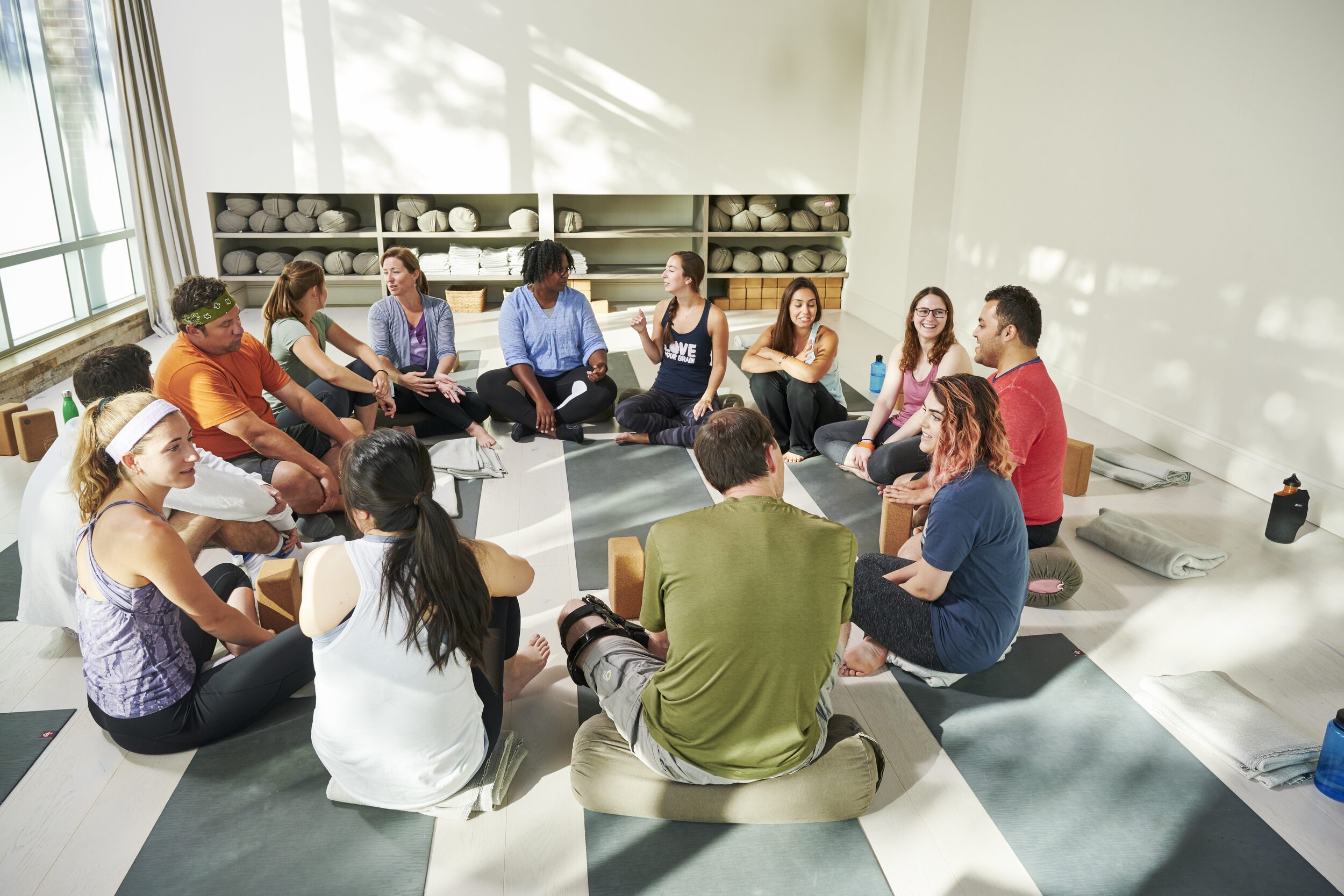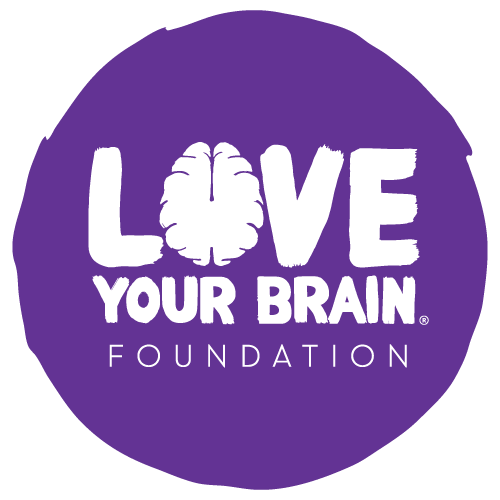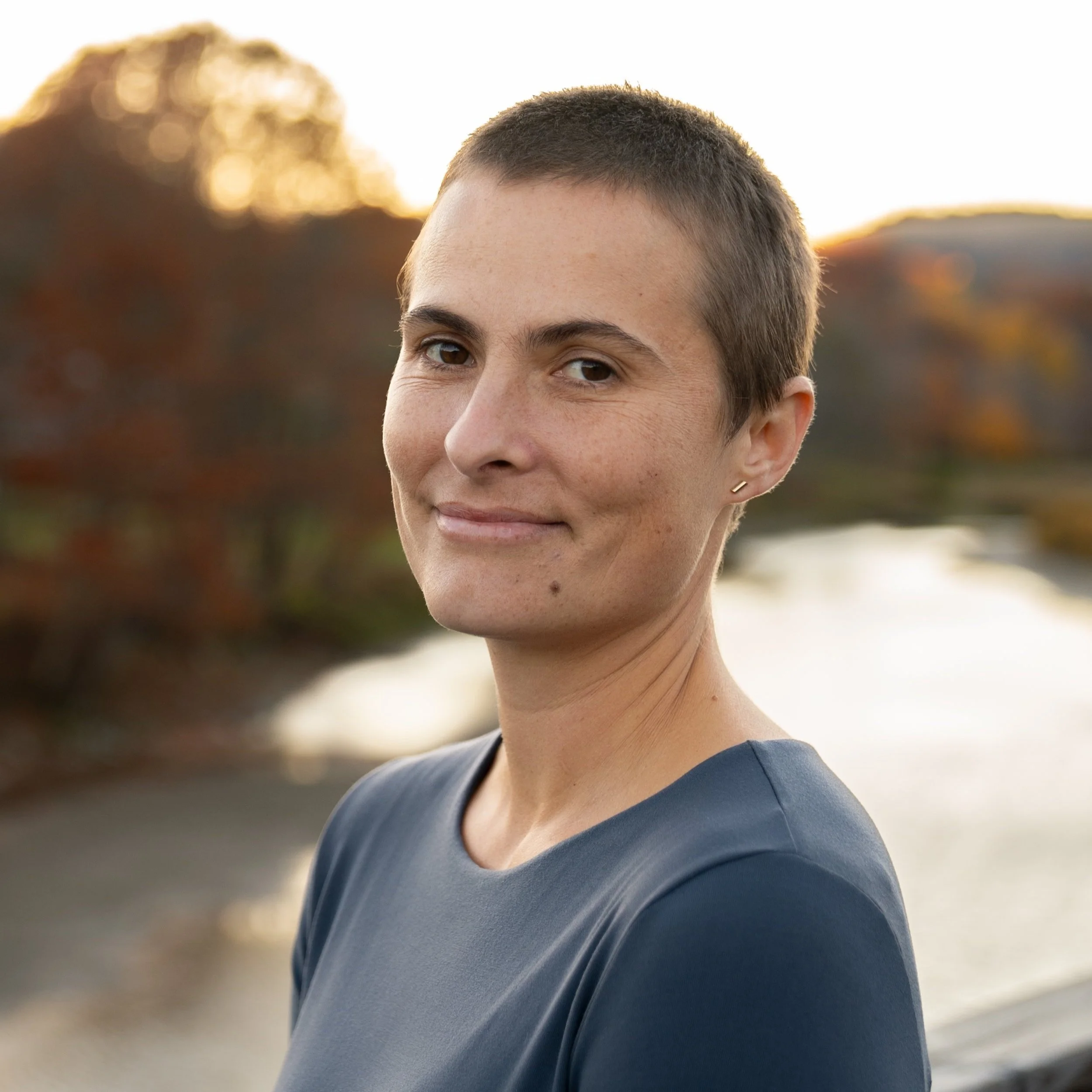
LoveYourBrain Yoga & Facilitation Training
Level 2
An interactive, 20-hour online training to equip you with new skills, knowledge, and hands-on experience in accessible yoga and group facilitation for the brain injury community. Use the research-backed LoveYourBrain Mindset curriculum as framework to learn:
Trauma-sensitive mindfulness, meditation, yoga nidra, and gentle yoga tools
Facilitation best practices to promote accessibility and belonging in online and in-person spaces
Strategies for creating boundaries, managing difficult emotions, and self-care
Facilitation methods for affirming intersectional identities to enhance Diversity, Equity, and Inclusion (DEI)
Registration for our March 2026 training will open soon!
What are the details?
20 hours total | 2 hour modules
Location: Interactive/Live on Zoom (online training) all times in Eastern Time (ET)
Cost
We offer trust-based, sliding scale payment options and scholarships to promote DEIAB.
$495 USD - Actual cost
$763 USD - Supporter*
$990 USD - Sponsor*
Contribute to our Training Scholarship Fund to increase diversity and equity in yoga and healthcare!
Payment (non-refundable) due in full 1 week after acceptance. If your plans change, you can transfer to a future training once.
Training Modules
Our series of two-hour modules are led by a broad teaching team with expertise in trauma-sensitive mindfulness and yoga, somatics, Diversity, Equity, and Inclusion, and community-based programming for brain injury. Below is a sample schedule from our 2025 training:
Week 1
Sunday, March 16th, 10am-12pm & 2-4pm ET: LoveYourBrain & Mindfulness, Resilience, and Community Programs for Brain Injury | Facilitation Best Practices
Friday, March 21st, 2-4pm ET: Accessible Mindfulness & Meditation
Sunday, March 23rd, 10am-12pm & 2-4pm ET: Boundaries, Difficult Emotions & Self-care | Yoga Nidra for Brain Injury
Week 2
Tuesday, March 25th, 2-4pm ET: Facilitation Methods to Enhance Diversity, Equity, and Inclusion (DEI) in Programs
Thursday, March 27th, 2-4pm ET: Creating LGBTQIA+ Affirming Spaces within the Brain Injury Community
Week 3
Tuesday, April 1st, 2-4pm ET: Gentle Yoga & Mindful Movement by Chair and Mat
Thursday, April 3rd, 2-4pm ET: Integration & Facilitation/Teaching Practicum
*Friday, April 4th, 2-4pm ET: LYB Mindset Program Mechanics (required for trainees interested in facilitating the LYB Mindset program)
-
Michelle (she/her) is an activist, social justice warrior, author, dismantling racism trainer, yoga teacher and practitioner, and an intuitive healer. With over 20 years experience leading dismantling racism work and as a licensed clinical social worker, she has a deep understanding of how trauma impacts the mind, body, spirit, and heart. Michelle’s awareness of the world through her own experience as a Black woman allows her to know, first-hand, how privilege and power operate.
Michelle has a Bachelors of Arts degree from the College of William and Mary and a Masters degree in Social Work from the University of North Carolina-Chapel Hill. She has worked in several non-profits and served as an elected official and on many non-profit boards of directors. Michelle has led Dismantling Racism Trainings with large corporations, small non-profits, and community groups, including the ACLU-WA, Duke University, Google, This American Life, The Center for Equity and Inclusion, Eno River Unitarian Universalist Church, Lululemon, and many others. Michelle published Skill in Action: Radicalizing Your Yoga Practice to Create a Just World in 2017 and Finding Refuge: Heart Work for Healing Collective Grief in 2021, and created her own podcast, Finding Refuge, which explores collective grief and liberation.
-
Tristan (they/he) is a writer, educator, digital strategist, and equity-inclusion facilitator who holds space for learning and unlearning about gender as it relates to trans inclusion and queer competency. They also teach marketing practices to foster business growth from a justice and equity-focused perspective. Their intention is to offer this work with an anti-oppression and intersectional lens.
Tristan was named one of Yoga Journal’s 2021 Game Changers and they were awarded the Reclamation Ventures grant in Spring 2021 to expand their offerings and dedicate time to writing their first book.
Tristan is proud to serve on the Board of Directors at Accessible Yoga, a non-profit working, through education and advocacy, to share the teachings and benefits of yoga with those who have been marginalized, and to identify and remove barriers to access, build strong networks, and advocate for an accessible, equitable yoga culture.
-
Jonathan (he/him/his) is a Board Certified Clinical Chaplain and Pastoral Counselor, with an extensive background in hospice, cancer care, hospital Chaplain, and a spiritual practice as an ordained monk and student of Zen Master Thich Nhat Hanh. Jonathan’s practice is to support people experiencing illness and end of life, foster effective caregiving, and reconnect people with their innate wisdom and compassion. Jonathan is the founder of Wise Caregiving, a non-profit dedicated to helping people become effective, sustainable, and empathetic caregivers.
-
As someone who identifies mixed-race, gender nonbinary, and from the in-between spaces, Ramsay (they/them) knows that they cannot deny another without also denying themself, and is called to keep opening to the complexity that exists within each of us. Ramsay believes yoga is a practice that allows for just this - seeing truth and coming to know ourselves, and in doing so being able to live with greater accountability and love. Ramsay is able-bodied, navigating PTSD, mental illness and other non-visible disabilities that give them compassion and understanding for tending to the parts of each other that we may not see or fully understand.
Ramsay co-leads the LoveYourBrain Teacher Trainings to offer yoga teachers and clinicians tools in how to adapt yoga and meditation practices to be accessible for the TBI community. They offer teaching expertise to make yoga accessible, individually healing, and empowering for all students through the LoveYourBrain Yoga, Mindset, and Retreat programs.
LoveYourBrain Faculty
-
Jackie Farrell (she/her) MS, OTR/L, CBIS, RYT-200 is an occupational therapist, LoveYourBrain yoga teacher and certified brain injury specialist. As a clinician and yoga teacher, she integrates evidence-based practices from her experience in neurological rehabilitation as well as applying emerging new evidence on yoga and meditation practices. Jackie led and assisted the LYB ‘FUNdamentals’ series in Boston, co-leads LYB Yoga Teacher Training and Training for Health Professionals and facilitates the LYB Mindset Program.
-
As the Program Manager for LoveYourBrain Mindset and Trainings, Bridget oversees their delivery, growth, and quality. She also mentors our large network of Facilitators to engage and empower them to skillfully deliver our research-backed curricula. She has a Bachelor’s degree in Psychology and is an ERYT-500. In addition to teaching yoga since 2015, Bridget has extensive experience in developing yoga teacher training curricula, as well as facilitating training programs. With a profound belief in the transformative power of yoga, she is dedicated to cultivating inclusive environments that embrace individuals of diverse backgrounds. More than anything, she aims to cultivate accessibility and equity within the yoga community, ensuring everyone has the opportunity to experience its healing capacity.
-
Kyla (she/her) has blended her expertise as a yoga teacher and researcher to develop a TBI-focused yoga curriculum that integrates gentle yoga, meditation, pranayama, and psychoeducation. This curriculum, now offered in yoga studios across the United States and Canada, is designed based on the science underpinning resilience, and empowers people with TBI to become more active participants in their healing process.
Kyla serves as the Senior Director of Programs, Research, and Operations, overseeing the design, implementation, and evaluation of LoveYourBrain programs on a large scale. She has been part of the Pearce family for years, and, following Kevin's accident, played an integral role in the launch of LoveYourBrain. By turning inward through yoga, Kyla believes we learn to be with our whole selves with greater compassion, which is fundamental to wellbeing and inspiring positive social change. She completed a Postdoctoral Research Fellow at Dartmouth College investigating the impact of yoga and meditation for people with neurological conditions.
What to expect?
Mindfulness
Learn a variety of simple, trauma-sensitive mindfulness practices and grounding techniques to open and close group programs
Learn best practices for leading TBI-friendly mindfulness in online spaces that foster nervous system regulation and community connection (outside/inside method)
Learn tips for offering mindfulness practices even if you are not a trained yoga or meditation teacher
How to describe research on mindfulness for the brain injury community
Gentle Yoga
Deepen skills in adapting gentle yoga and mindful movement for brain injury to support functional mobility and mind-body connection (builds upon the LoveYourBrain Yoga Teacher Training)
Practice and learn chair yoga techniques and how to teach hybrid mat/chair-based practices to enhance accessibility and safety
Learn best practices for offering yoga online for the brain injury community
Hands-on opportunities to practice teach gentle yoga practices and receive helpful feedback for growth
Yoga Nidra
Practice yoga nidra to embody the benefits of guided relaxation and mindfulness
Learn the science of yoga nidra and how it can be applied to support sleep and mental health among brain injury community
Learn best practices for tailoring yoga nidra to be accessible for the TBI/ABI population
Interactive exercise in how to lead intention setting as a strategy for healing and resilience
Facilitation Best Practices
Practice facilitation methods for working with common brain injury symptoms (e.g., inattention, memory, vestibular, screen sensitivity, PTS(D), dysregulation, isolation)
Learn tools for boundary setting as a foundation to offering sustainable and compassionate group support
How to skillfully work with your own and others’ difficult emotions in a group setting
Practices for tone setting, how to skillfully interrupt, and self-care when facilitating groups
Hands-on opportunities to facilitate group discussions and receive helpful feedback for growth
Psychoeducation & LoveYourBrain Mindset Curriculum
Learn the science of Growth vs. Fixed Mindset and the 10 factors of Resilience as they relate to healing from brain injury
Learn the 6-week, online LoveYourBrain Mindset curriculum, which incorporates TBI-focused yoga, mindfulness, and group discussion centered around resilience
Opportunities to practice and teach parts of the LoveYourBrain Mindset curriculum for experiential and applied learning
For people interested in being Facilitators in the LoveYourBrain Mindset, learn the program mechanics and logistics for facilitating the online yoga and group discussion programs
Creating affirming spaces to support Diversity, Equity, and Inclusion (DEI) within the brain injury community
Learn effective tools for delivering accessible online programs for people with brain injury
Learn how to create Agreements and Assumptions to build trust, accountability, and culture in group spaces
Learn facilitation methods for supporting neurodiverse, LGBTQ+, and BIPOC affirming spaces
Why and how to support LGBTQIA+ folks in our spaces. We’ll explore how to create language and culture shifts that do more than include members of the LGBTQIA+ community; we’ll explore how to actually create shifts that affirm folks who hold those identities.
Why and how to talk about pronouns. As a central linguistic tool, pronouns are used regularly when referring to someone without using their name. And when it comes to the transgender, nonbinary, and gender non-conforming community, pronouns are a core component of creating an affirming space. We must learn how to normalize conversations around pronouns, which inherently requires mindfulness and practice.
What happens when we make a mistake or when someone else does? We’ll explore harm-repair practices to support accountability and relationship-building, and how to center the needs of those most impacted in harmful moments.
Who is this training for?
Yoga teachers, health professionals, people affected by brain injury, caregivers, brain injury support group facilitators, CBIS, and others who want to deepen their understanding of mindfulness, meditation, and yoga for brain injury and become advocates for LoveYourBrain in their communities. This training is for you if:
You are a yoga teacher and have already taken our Level 1 training
You are a yoga teacher with other specialized accessible training in yoga for brain injury
You are not a yoga or meditation teacher, and are interested in learning the benefits of these practices and receiving basic tools in leading mindfulness practices yourself
You are already familiar with the realities of brain injury (you have a lived experience, are a caregiver, or have attended our Level 1 training)
You are involved in the brain injury community as an advocate, support group leader, clinician, CBIS, and want to learn how to offer an accessible online program that includes yoga, mindfulness, and/or group facilitation
You have experienced a brain injury, participated in a LoveYourBrain program and are interested in applying to become a LoveYourBrain Mindset Facilitator
How does this online training support learning?
Our trainings always prioritize a ‘feel’ of close connection and intimacy, so we offer this online training as a live, interactive program instead of a pre-recorded course. Although, in the past, we have offered compelling and comprehensive pre-recorded courses with Yoga International, we want these trainings to be about bringing our trainees together to share, learn, and grow together in real-time, even if not in the same physical space.
We support many styles of learning, incorporating movement-based yoga classes, lecture, large and small group work, interactive breakout sessions, live Q&As so there will be cohesiveness and engagement amongst all participants.
We offer closed captioning to make this training more accessible to all lived experiences, learning styles, and individual needs.
We realize screen time can be challenging, so we’ve scheduled this training into 2-hour modules broken out over two weeks.
We record the content and share with you all so that you will have ongoing access to the content. We upload recordings on YouTube where closed captioning is available. However, at this time we are unable to provide closed captioning during the live meetings and breakout sessions.
FAQs
View all Trainings Frequently Asked Questions here!
Are there any prerequisites?
We require trainees to have completed our LoveYourBrain Yoga for Traumatic Brain Injury - Level 1 Training or our LoveYourBrain Yoga for Health Professionals Training, unless you already have a strong understanding of traumatic brain injury and receive permission from LYB.
How is this different from the LYB Yoga for Traumatic Brain Injury - Level 1 Training?
Our Level 1 training is geared towards yoga teachers, clinicians, and people affected by brain injury who either want to teach accessible yoga to people affected by brain injury or deepen their personal practice. We expect that participants in the Level 1 training do not have an extensive background in traumatic brain injury, so we have a didactic module on defining traumatic brain injury, common symptoms, etc, which we do not include in our Facilitation Training.
This training is intended for graduates of the Level 1 training to deepen their skills in offering accessible yoga asana (movement-based practices) and mindfulness practices, as well as incorporate new information and practices like yoga nidra. It is also designed to offer more nuanced skills in offering facilitated group discussion and connection - expanding on tools for boundary setting and self-care, managing difficult emotions, enhancing inclusive practices to support diversity, harm repair and relationship building.
Will I receive any certification?
Yes, after full participation in this training and completion of the prep work, you will be “LoveYourBrain Facilitator certified” and receive a specialized logo and certificate of completion to demonstrate you are certified to facilitate groups using specialized mindfulness, yoga, and psycho-education tools for the brain injury community.
Will I be a LYB Mindset Facilitator after completing this training?
After completing this Level 2 training, check out the requirements to be a Mindset Facilitator. Once all those are complete, we encourage you to apply within 2 weeks of completing the Level 2 training!
Be the first to know when registration opens!







